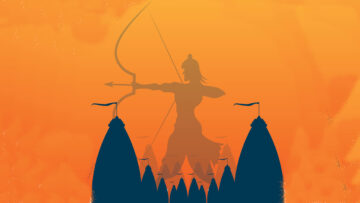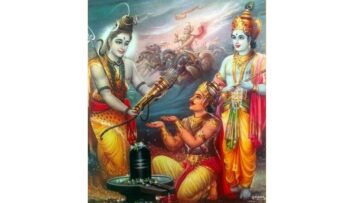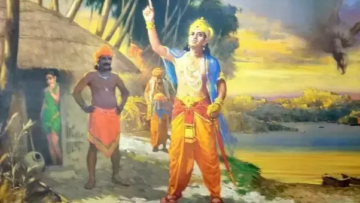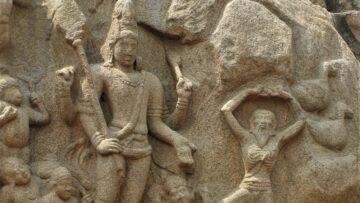This offer of Krishna to Karna is the most discussed part from Mahabharata. It is one of the most debated topics since it involves Draupadi Whom Krishna mentions in his speech to Karna while offering the royal crown of the Kuru kingdom.
Krishna comes to Hastinapura on his peace trials. His mission fails but before leaving for Upaplavya, meets Karna alone. He reveals the secret of Karna’s birth and suggests that as the eldest of the Pandavas Karna should join them.
Krishna offers the crown of Hastinapur to Karna and then says
ShashThe cha tvAM tathA kAle draupadyupagamiShyati || 15||
So what did Krishna say? Did he say that Draupadi will accept Karna as her sixth husband?
No. Krishna did not offer Draupadi to Karna. It is a misconception.
Krishna’s words to Karna are:
rAjAno rAjaputrAshcha pANDavArthe samAgatAH |
pAdau tava grahIShyanti sarve chAndhakavRRiShNayaH || 13||
hiraNmayA.nshcha te kumbhAnrAjatAnpArthivA.nstathA |
oShadhyaH sarvabIjAni sarvaratnAni vIrudhaH || 14||
rAjanyA rAjakanyAshchApyAnayantvabhiShechanam |
ShashThe cha tvAM tathA kAle draupadyupagamiShyati || 15||
adya tvAmabhiShi~nchantu chAturvaidyA dvijAtayaH |
purohitaH pANDavAnAM vyAghracharmaNyavasthitam || 16||
(Bori critical Edition Udyoga Parva ch.138)
Krishna was describing the coronation procedure involved in making Karna crowned as the king.
“Golden water pots as also silver and earthen ones (filled with water) and medicinal herbs and all sorts of seeds and gems, let the kings and daughters of kings bring for your anointment (in the kingship) at the (shaShti kaal) the sixth part of the day and Draupadi also will come to you to carry on the procedure)”( 5,140.)
This was what he exactly said.
Both verses speak about the coronation procedure. They are interlinked as they are meant to elaborate the way the events would happen.
What is Shashti Kaal?
Shukla Shashti is the name for the 6th Tithi (a lunar day). It is the 6th Tithi of Shuklapaksha. Its nature is Yasha Prada(offers fame) which can be interpreted as the hour; “one that gives fame”
It is good for the following works: house, land; service, social customs, market & marketing, trade, sale – purchase; art, painting of sculpture, woodwork, war, deeds related to Pitris (ancestors), jewelry, clothes designing, oil massage, donation and welfare, actions related to water, etc.
The most classical texts, Jyotisha Ratnakara, Muhurta Chintamani, Poorva Kalamrita, and Brihat Samhita tell us of the auspiciousness of Shashti kaal. Karttikeya presides over this day. It is favorable for coronations, meeting new friends, festivities, and enjoyment.
Therefore the translation done for these verses in popular versions does not fit into the standard narrative.
The preceding line and the following line related to Draupadi from the verse convey the whole procedure about the coronation. To talk about Draupadi’s intimacy with Karna in that context is absurd. Even the first part of that verse talks about queens and princesses bringing various items for the coronation. So how can that be followed suddenly by Draupadi’s approval of him as her husband?
KMG translates this thus; “During the sixth period, Draupadi will also come to thee (as a wife)”
I don’t know why he went with that word in brackets. Bori also did the same.
I have heard from many scholars whose version also matched with mine fits in with the rest of the narration
The verse and translation
The sixth period means the sixth part of the day, that is dusk. (1.dawn 2.morning 3.noon 4.afternoon 5.evening 6.dusk 7.night). And dusk is considered the most auspicious time for activities like a coronation.
षष्ठान्न त्रि० षष्ठो दिवसस्य षष्ठकालः अन्नस्य तद्भोजनम्य
कालो यस्य । दिवसस्य षष्ठभागे अन्नभोजनकालयुते पुरुषे ।
षष्ठान्नकाल पु० षष्ठे दिवसे भक्ष्यान्नकालो यत्र । व्रतभेदे ।– (वाचस्पत्यम्)
Shasthanna (tri.) Shastho divasasya shashtakaalah.
Annasya tadbhojanasya kaalo yasya.
Divasasya shashtabhaage annabhojanakaalayute purushe.
Shastaannakala (pu). shashte divase bhakshyaannakaalo yatra. vratabhede.
Vachaspatyam mentions that Shashtannakaala is the time for meals for one who is fasting.
During the coronation ceremony, the king to be coronated should be fasting for three or four days. Gobhila says that fasting should be for four days. Fasting during Coronation was to be done by Karna, as a part of the coronation procedure.
By saying that, “Draupadi will come”, Krishna did not mean that she will come as his wife.
Krishna meant that Draupadi will come to break Karna’s fasting during Shashti Kaal. She, as the queen who serves food on auspicious occasions, will take the responsibility to approach Karna and serve him food.
The Mahabharata epic does describe Draupadi serving food during Rajasuya sacrifice to thousands of Brahmins and guests. Draupadi herself reveals this fact before Satyabhama in Vana Parva.
So Karna might have to take the vow of fasting for three or four days, and when it is time for him to break the fast, during Shashti Kaal, Draupadi will come there to help him break his fast by offering fast appropriate food.
Here Krishna was merely mentioning that Draupadi along with other queens and princesses would come to Karna’s coronation. In Particular, he mentions Shashti kaal indicating her participation in serving food.
Krishna ascertains Draupadi’s presence because she is the First Lady of the Pandava Family.
The animosity between her and Karna during dyutasabha may make Karna apprehensive of her reaction if he enters as the Eldest into the Pandava family and King to be.
Draupadi herself might not like to participate, remembering Karna’s abusive words in the sabha. Thus Krishna assures Karna on behalf of Draupadi, that the queen of Pandavas would also leave the past behind and attend the ceremony.
Moreover, Krishna very well knows the reason behind Draupadi having five husbands (Lord Shiva’s boon, etc.). He also knows how much she loathes Karna. So Krishna suggesting that Draupadi would marry Karna is not acceptable to many scholars with whom I interacted on this subject.
Krishna was the soulmate of Arjuna. He knew how Arjuna nourished a wound in his heart since the time Karna insulted Draupadi and suggested her disrobing. He said this when Sanjaya visited Upaplavya:
Krishna’s words to Sanjaya
parAjitAste patayo na santi; patiM chAnyaM bhAmini tvaM vRRiNIShva || 36||
yo bIbhatsorhRRidaye prauDha AsI;dasthiprachChinmarmaghAtI sughoraH |
karNAchCharo vA~NmayastigmatejAH; pratiShThito hRRidaye phalgunasya || 37||
kRRiShNAjinAni paridhitsamAnA;nduHshAsanaH kaTukAnyabhyabhAShat |
ete sarve ShaNDhatilA vinaShTAH; kShayaM gatA narakaM dIrghakAlam || 38||
(Bori Udyoga Parva 29)
“O Daughter of Drupada thou hast no refuge. Better betake thyself as a bond-woman to the house of Dhritarashtra’s son. Thy husbands, being defeated, no longer exist. Thou hast a loving soul, choose someone else for thy lord.” This speech, proceeding from Karna, was a wordy arrow, sharp, cutting all hopes, hitting the tenderest parts of the organization, and frightful. It buried itself deep in Arjuna’s heart.”( 5.29)
Krishna treats Draupadi as his friend. He is aware of her feelings. He knows that Karna has actively participated or rather played a vital part in the disrobing of Draupadi. No woman with self-respect will forgive and forget such a heinous act.
In Vana Parva, Krishna visits the Pandavas in exile. There Draupadi laments about her fate before Krishna and he assures her with the strictest of punishment to her culprits.
Draupadi’s lament
ye mAM viprakRRitAM kShudrairupekShadhvaM vishokavat |
na hi me shAmyate duHkhaM karNo yatprAhasattadA || 113||
athainAmabravItkRRiShNastasminvIrasamAgame |
rodiShyanti striyo hyevaM yeShAM kruddhAsi bhAmini || 114||
bIbhatsusharasa~nChannA~nshoNitaughapariplutAn |
nihatA~njIvitaM tyaktvA shayAnAnvasudhAtale || 115||
yatsamarthaM pANDavAnAM tatkariShyAmi mA shuchaH |
satyaM te pratijAnAmi rAj~nAM rAj~nI bhaviShyasi || 116||
(Bori Vana Parva 13,14)
“O slayer of Madhu, for ye all, beholding be treated so cruelly by inferior foes, sit still unmoved! My grief at Karna’s ridicule is incapable of being assuaged! On these grounds I deserve to be ever protected by thee, O Kesava, viz., our relationship, thy respect (for me), our friendship, and thy lordship (over me)Vaisampayana continued, ‘In that assembly of heroes Vasudeva then spoke unto the weeping Draupadi as follows, ‘O fair lady, the wives of those with whom thou art angry, shall weep even like thee, beholding their husbands died on the ground, weltering in blood and their bodies covered with the arrows of Vivatsu. ( 3.12)
Hence, Krishna would never have insulted Draupadi by offering her to Karna, to be his wife. By doing so he won’t hurt his friend Arjuna. Especially after knowing the previous birth story of Panchali and the Pandavas.
Krishna would never offer Draupadi to Karna, which would be taking a stand against the statements of Lord Shiva and sage Veda Vyasa.
Footnotes
- Bori Critical Edition Of Mahabharata
- Kisari Mohan Ganguli English Translation Of Mahabharata
- Southern Recension Of Mahabharata, Kumbakonam Edition
- Gita Press Gorakhpur Hindi Translation by Pandit Shri Ramnarayan
- Bharata Bhava Dipika ..Nilakantha Chaturdhar
Featured Image Credits: Head Topics
Disclaimer: The opinions expressed in this article belong to the author. Indic Today is neither responsible nor liable for the accuracy, completeness, suitability, or validity of any information in the article.










